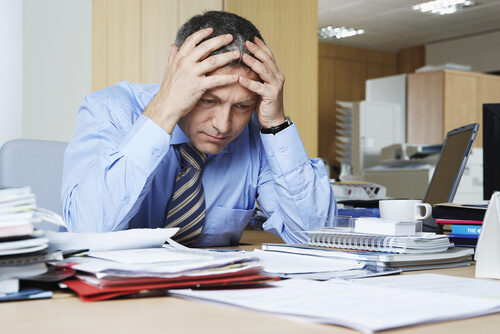What Psychological Exhaustion Looks Like


Written and verified by the psychologist Valeria Sabater
Psychological exhaustion weakens us both physically and mentally. It’s something that arises as a result of having too much to do or think about. Too many decisions, too many intrusive thoughts, too much work, too many obligations, interruptions, anxieties…the list goes on.
On the other hand, it’s also not having enough of many things in life. Not enough quality time for yourself, not enough sleep, not enough inner peace and calm. Read on and find out about the many signs of psychological exhaustion and how to take action before it’s too late.
We all know what it feels like to be burned out on all levels. It’s important to keep in mind that a tired brain, one that is psychologically exhausted, works and responds to stimuli completely differently. Neuroscientist Matthew Walker was able to demonstrate at in the lab that mentally tired people have a more negative perception of their reality. In addition, they are much more emotionally sensitive.
Sometimes you just get tired, you are exhausted, devoid of strength, alone in your discouragement where everything loses its meaning, its beauty, its spontaneity …
One mistaken idea we often have is that psychological exhaustion is due, in essence, to a fateful accumulation of errors, bad decisions, failures, or disappointments. This is just not true. Most of the time fatigue is something else entirely. It’s the direct result of having too much to do without realizing that it’s just too much for us.
We’ve all heard that our perspective depends on how we see the glass, either half full or half empty. Sometimes, just one more drop is the final straw and we reach our limit. Psychological exhaustion completely takes over.

Psychological exhaustion: an all too common problem
Charlie feels satisfied with his life; actually, he couldn’t ask for more. He’s a graphic designer, he enjoys his work, he has a wife that he adores and he has just become a father. He’s happy with everything around him and has no big problems in his life.
However, he’s starting to notice that it’s getting harder and harder for him to make decisions. His mood is more irritable, he can’t concentrate, and he even has trouble falling sleep.
He just can’t understand what’s happening to him. Everything seems fine; in fact he should feel happier than ever. But in his mind there is a kind of sensor that’s telling him, “something is not quite right.”
If we had someone looking into Charlie’s life from the outside, that person could point out several things to him to possibly keep him from burning out.
One of things they would point out (and deep down, Charlie already knows it) is that he has too many things going on at once in his life. A promotion, new work projects, and clients to keep happy, a child and a mortgage. He’s also at a time of his life where he’s wanting everything to be “perfect.”
All of this at once means Charlie has less time for each of these responsibilities, and it’s simply becoming too much for him. It’s endangering his ability to be able to manage things. His mental exhaustion is evident, and it’s burning him out. Here are some signs of physical exhaustion and how it affects us.

Signs of psychological exhaustion
- Physical fatigue and loss of energy. The exhaustion sometimes gets so bad that we get up in the morning sure we won’t be able to get through the day.
- Insomnia. At first it’s common to wake up suddenly during the night, but later on this can turn into serious difficulties falling sleep.
- Memory loss. According to an article published in the Journal of Forensic Psychiatry and Psychology, psychological exhaustion often produces a cognitive impairment called the “disinformation effect.” This is where we confuse information, and where we recall it incorrectly, mixing up images, people, and situations.
- Regarding physical symptoms: Palpitations, digestive problems, headaches, loss of hunger, or an excessive increase in appetite are all common.
- On an emotional level, we may become more sensitive, and at the same time apathetic, irritable, and pessimistic.
- Also, another common feature is anhedonia, that is, the inability to feel pleasure, to enjoy things as much as we did before. We no longer look forward to things and life turns gray, with the world seeming far away.
“Sleep is a good mattress for fatigue”
-Juan Rulfo-
How to cope with psychological exhaustion
Eric Hoffer said that the worst tiredness comes from work that you haven’t done. It’s so true. Sometimes real exhaustion comes because of everything we want to do and don’t do. Because of all those daily goals that we set ourselves but are too much, or that we don’t get around to doing. And because of those that we have to give up on because we’re under too much pressure.
Then, finally, it happens. The final straw arrives, and it breaks the camel’s back. That’s when everything gets out of hand. So the first thing to do is to realize what is happening to us.
Psychological exhaustion is looming over us and we must prevent the “creature” from getting bigger, darker, and more heavier. Let’s take a look at the following 3 steps that we should put into practice.

3 “permissions” you must give yourself in order to clear the clouds of mental fatigue
- Give yourself permission to rediscover yourself. It may seem ironic, but psychological exhaustion tends to imprison us in layer upon layer of worries, pressure, duties, and anxieties. To the point that we actually forget ourselves. Give yourself permission to find yourself again, and to do this, there is nothing better than enjoying an hour a day completely disconnected from all types of stimulation. Away from people, sounds, artificial lights, technology etc. Find a quiet environment to simply “be.”
- Give yourself permission to prioritize. This is absolutely essential. Remember what your priorities are, where your identity is, what you love, what makes you happy. The rest will be secondary and should not merit such emotional and personal investment on your part.
- Give yourself permission to be less demanding. There are 24 hours in a day, and life, whether we like it or not, has its limits. Learn to be realistic with your time. Don’t put too much pressure on yourself or set yourself overly high standards. You don’t need everything to always be perfect. Sometimes, it’s enough for everything to be the same as yesterday. Sometimes a modest, quiet balance is enough.
To conclude, we know that life keeps getting more and more demanding and that we want to do everything. But it’s worth remembering this: We are made up of flesh and blood, a heart and psychological “muscles” that need to be fed with quality time, rest, peace, and leisure. Let’s learn to put ourselves first and look after ourselves like we deserve …
This text is provided for informational purposes only and does not replace consultation with a professional. If in doubt, consult your specialist.








